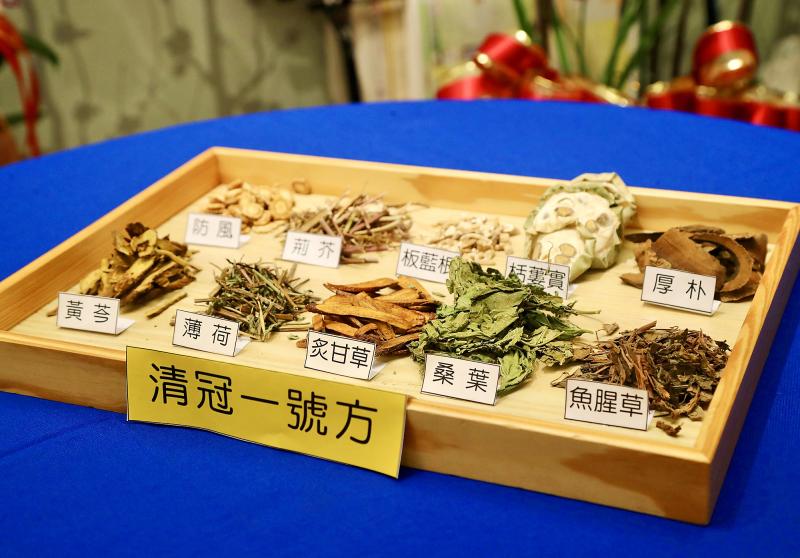The Ministry of Health and Welfare has proposed that NT$70 million (US$2.38 million) be allocated next year to subsidize the cultivation of medicinal plants in a bid to reduce dependency on ones imported from China.
Taiwan imports more than 20,000 tonnes of materials per year from China to make traditional Chinese medicines, including the herbs used to make Taiwan Chingguan Yihau (清冠一號), or NRICM101, a locally developed traditional herbal formula that is deemed effective against COVID-19.
To reduce reliance on medicinal herbs from China, the ministry said that it has worked with the Council of Agriculture (COA) to develop a list of plants that are edible and medicinal, and can be planted in Taiwan, including lycium, Chinese angelica, rehmannia, chrysanthemum, lily-turf and salvia root.

Photo: CNA
The ministry said it has improved techniques for cultivating salvia root and is working on applications of the herb at the council’s Hualien District Agricultural Research and Extension Station.
The techniques were shared with the Jian Township Farmers’ Association in Hualien City, which has long worked with salvia root farmers, the ministry said.
However, most medicinal plants are grown on a small scale in Taiwan, so the ministry on Wednesday proposed a traditional Chinese medicine revitalization plan, Department of Chinese Medicine Director-General Huang Yi-tsau (黃怡超) said on Friday.
The National Development Council has approved the proposal and the plan’s budget would subsidize the cultivation of herbal plants, as well as processing and quality control, Huang said.
The ministry would cooperate with the council, the National Research Institute of Chinese Medicine and the Council of Indigenous Peoples to promote organic farming that is “plant-friendly,” he said.
Farmers who rent national land for the cultivation of medicinal plants would be guaranteed a 10-year lease and receive a bonus for helping to reduce Taiwan’s reliance on imported plants, Huang added.
COA Deputy Minister Chen Junne-jih (陳駿季) said that promoting the cultivation and use of medicinal plants has been a priority for the council over the past few years.
For example, it has worked with researchers to prove that Formosa lambsquarters is an effective treatment for diabetes in animals, Chen said, adding that pharmaceutical companies later conducted clinical trials on the plant.
Standardized procedures are crucial in the cultivation of medicinal plants, so the council is establishing guidelines for plant spraying and quality control, he said.
As the Regulations Governing the Primary Processing of Agricultural Products (農產品初級加工管理辦法) covers the cutting, drying and roasting of medicinal plants, farmers can complete the whole process from growing the plants to their primary processing, he said.
Contract and large-scale farming are the preferred methods for medicinal plants, as they allow the plants to be managed more easily following their harvest, he added.

Palauan President Surangel Whipps Jr arrived in Taiwan last night to kick off his first visit to the country since beginning his second term earlier this year. After arriving at Taoyuan International Airport at around 6:30 pm, Whipps and his delegation were welcomed by Minister of Foreign Affairs Lin Chia-lung (林佳龍). Speaking to gathered media, the Palauan leader said he was excited and honored to be back in Taiwan on his first state visit to Taiwan since he was sworn in this January. Among those traveling with Whipps is Minister of State Gustav N. Aitaro, Public Infrastructure

President William Lai (賴清德) yesterday thanked Palau for its continued support of Taiwan's international participation, as Taipei was once again excluded from the World Health Assembly (WHA) currently taking place in Switzerland. "Palau has never stopped voicing support for Taiwan" in the UN General Assembly, the WHO and other UN-affiliated agencies, Lai said during a bilateral meeting with visiting Palau President Surangel Whipps Jr. "We have been profoundly touched by these endorsements," Lai said, praising the Pacific island nation's firm support as "courageous." Lai's remarks came as Taiwan was excluded for the ninth consecutive year from the WHA, which is being held in

RESOLUTIONS DEBATE: Taiwan’s allies said that UN and WHA resolutions cited by China and other nations ‘do not determine Taiwan’s participation in WHO activities’ A proposal to invite Taiwan to this year’s World Health Assembly (WHA) was rejected on Monday, resulting in Taipei’s absence from the annual meeting for a ninth consecutive year, although partners spoke up for Taiwan’s participation at the first day of the meeting. The first agenda item after the opening was a “two-on-two debate” on a proposal to invite Taiwan to participate at the WHA as an observer. Similar to previous years, two countries made statements in favor of the proposal, while two others expressed their opposition. Philippine Secretary of Health Teodoro Herbosa, president of the 78th WHA, accepted the WHA General Committee’s

At least three people died and more than a dozen were injured yesterday afternoon when a vehicle struck a group of pedestrians in New Taipei City’s Sansia District (三峽). The incident happened at about 4pm when a car rammed into pedestrians at an intersection near Bei Da Elementary School. Witnesses said the sedan, being driven at a high speed, ran a red light, knocking scooters out of the way and hitting students crossing the road before careening into a median near the intersection of Guocheng and Guoguang streets. The incident resulted in three deaths and 13 injuries, including the driver, a 78-year-old man